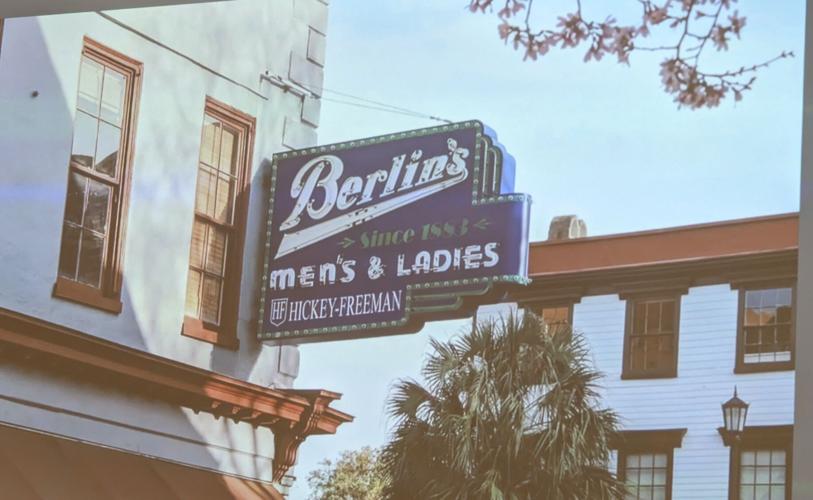While South Carolina is best known for being the birthplace of the American Civil War at Fort Sumter and where barbeque originated, not everyone is aware of the impact of Jewish settlers and their descendants on the Palmetto State’s largest city of Charleston.
The history of the ethnoreligious group dates back to the 1700s, explained local historian Doreen Larimer during her appearance at the April 2 Rotary Club of Mount Pleasant meeting. In fact, several Jews relocated to Charleston in the 1700s from London, and by 1800, there were more Jewish folk residing in South Carolina (approximately 2,000) than in any other state.
“In the late 1800s, there was a different migration coming. This would have been from Eastern Europe and Russia coming to Charleston. And when they settled in [South] Carolina, and in Charleston, they’re primarily on Main Street and St. Philip Street,” said Larimer.
World War II brought in a new influx of Jews, but by that time, an assortment of Jewish merchants were already thriving in the area.
By 1948, shared Larimer, there were more than 1,900 Jews living in the Holy City, with most serving as merchants who peddled clothing. About 75 percent of them, she noted, were born in the United States.
The raconteur apprised Rotarians of the common line of generational progression that would emerge, as the initial wave of ancestors were primarily store employees. Their children would go on to open their own stores, while their offspring oftentimes became doctors and lawyers.
Among the more prominent turn-of-the-century merchants was Isaac Wolf (also spelled Wolfe) Banov, a Poland native born in 1862, who operated a tailor shop on King Street before partnering with Joseph Volaski (his wife’s half-brother) to open Banov & Volaski in 1892.
Currently occupied by the Francis Marion Hotel in Downtown Charleston, Banov & Volaski sold ready-made men’s clothing, gents’ furnishings, hats and shoes. An old flier reads: “The Maximum of Value at a Minimum of Price.”
One of the individuals who worked in the store was Banov’s cousin, Sam Berlin, who went on to assume ownership of a local men’s apparel shop, known as Berlin’s. The retail venue — which is still in existence today — was founded in 1883 by an Eastern European immigrant, Henry Berlinski, who moved to the US with $1.38 in his pocket.
Another enterprising employee whose career path began at Banov & Volaski was Jack Krawcheck, who immigrated from Poland with his parents in 1906 at the age of seven.
Krawcheck and his wife, Esther Bielsky Krawcheck, had four children, the youngest of whom (Lenny, 83, a local attorney) was in the audience during Larimer’s presentation.
After toiling in a men’s clothing shop as a delivery boy, the elder Krawcheck began clerking, a term used for employees who performed sales duties. In 1922, he launched his own clothing business known as Jack Krawcheck (also referred to as Jack’s Clothiers) at 313 Main St.
The entrepreneur would frequently embark on sales trips to New York City’s Garment District, according to Larimer, to comb through swatch books and select certain fabrics for his suits, as well as communicating the kind of cut he preferred in his apparel.
In 1937, Krawcheck acquired 311 King Street at the rear of his store and built an iconic landscaped garden space at the site, featuring a brick arch and a huge oak tree.
The industrious business man was also active in his community. In addition to winning the first Carolopolis Award from the Preservation Society of Charleston — of which he was a member and two-term president — Krawcheck was also a 50-year member of the Charleston Downtown Rotary Club. Additionally, he served on the boards of the Boy Scouts and Salvation Army.
His benevolence didn’t stop there, as the famed merchant funded scholarships for medical students, along with supervising an 11-year beautification project at Marion Square.
Krawcheck eventually opened a women’s companion shop as well. But perhaps the most enduring aspect of his sartorial acumen is the style and/or suit design he hand selected that can still be seen today. The natural shoulder, two-button jacket with front-flat slacks look, said Larimer, is currently popular among males who regularly sport formal attire, including TV personality/political commentator Stephen Colbert, who spent a portion of his formative years on James Island.
Another Jewish merchant Larimer touched on was Edward Kronsberg, who opened Edward’s, a 15,000 square foot department store, in 1948 at the northwest corner of Morris and King streets.
In his pursuit of building more retail space in the north part of town along Rivers Avenue, now known as North Charleston, Kronsberg created the Pinehaven Shopping Center in 1958, the largest retail outlet of its time, including 23 stores.
The contributions of the highlighted Jewish merchants, Larimer added, “ ... created the Charleston that we know and love today.”
The Rotary Club of Mount Pleasant invites community members to attend their weekly Wednesday meetings at the Mount Pleasant Presbyterian Church, starting at noon.




